Did you know that distracted driving is responsible for nearly 400,000 injuries and over 3,000 deaths annually in the U.S. alone? According to the AAA Foundation for Traffic Safety, 87% of drivers behave unsafely. Adding in the issues like excessive idling, harsh braking, and non-compliance with HOS rules increases the risks for safety violations.
But here’s the kicker: fleets monitoring and managing driver behaviors see up to a 20% reduction in accidents. It can save not only thousands of lives but also optimize fuel usage. Using advanced tools to monitor driver behavior and performance allows fleet managers to monitor the metrics closely. Let’s take a closer look at how fixing driving behavior can save you loads of money.
Why is monitoring fleet driving behavior critical
Monitoring driver behavior is more than just avoiding accidents. Risky driving can become the root cause of several hidden charges, such as legal fees, insurance hikes, and even loss of productivity. If a trucking company collects and analyzes the driver driving data, fleet managers can identify and pinpoint the fleet driving patterns that cause an increase in fuel usage.
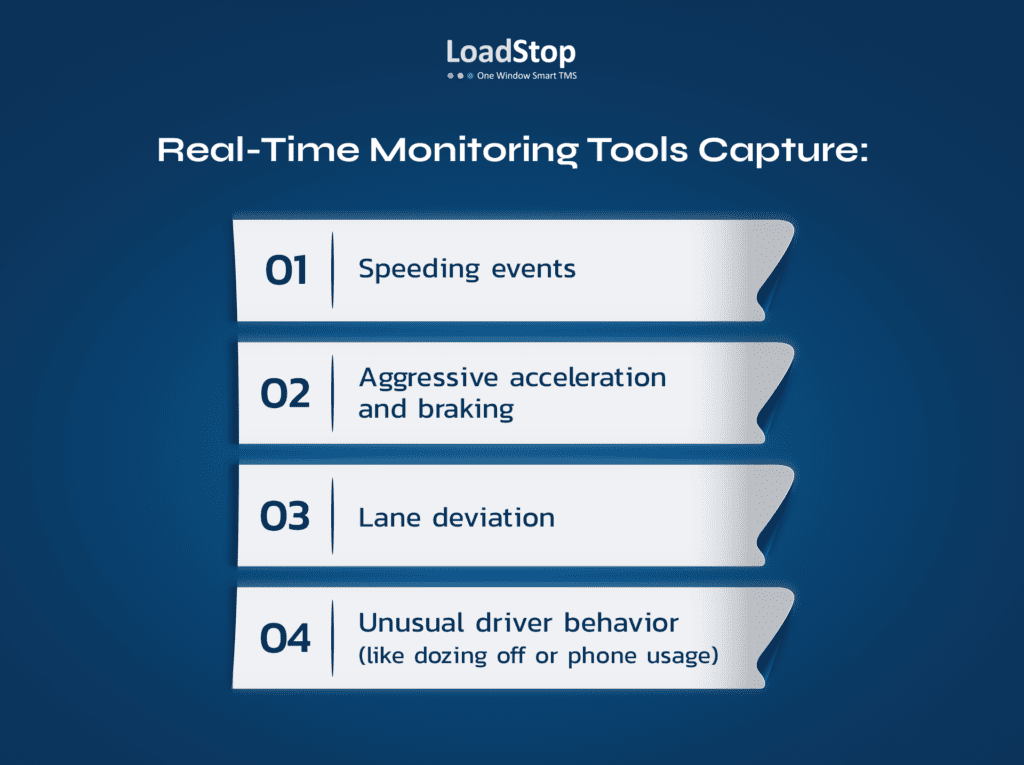
Telematics systems, dashcams, and driver scorecards give fleet managers real-time visibility into on-road behavior, allowing them to proactively address issues before they become costly. With driver behavior directly impacting operational efficiency, investing in monitoring tools is not optional anymore.
Top strategies to improve fleet driver performance
With the right tools, training, and support systems, fleet managers can significantly reduce risky behaviors, lower operational costs, and improve driver retention. Let’s explore the most effective strategies to optimize driver performance and overall fleet safety.
Implement a fleet driving safety program
A responsible operation is built on a solid fleet safety policy. To guarantee that all drivers are aware of the standards they are being held to, start by clearly defining what constitutes appropriate driving behavior and outlining the penalties for noncompliance. Important safety guidelines like limiting cell phone use while driving, using defensive driving strategies, and doing routine car checks should all be part of the program.
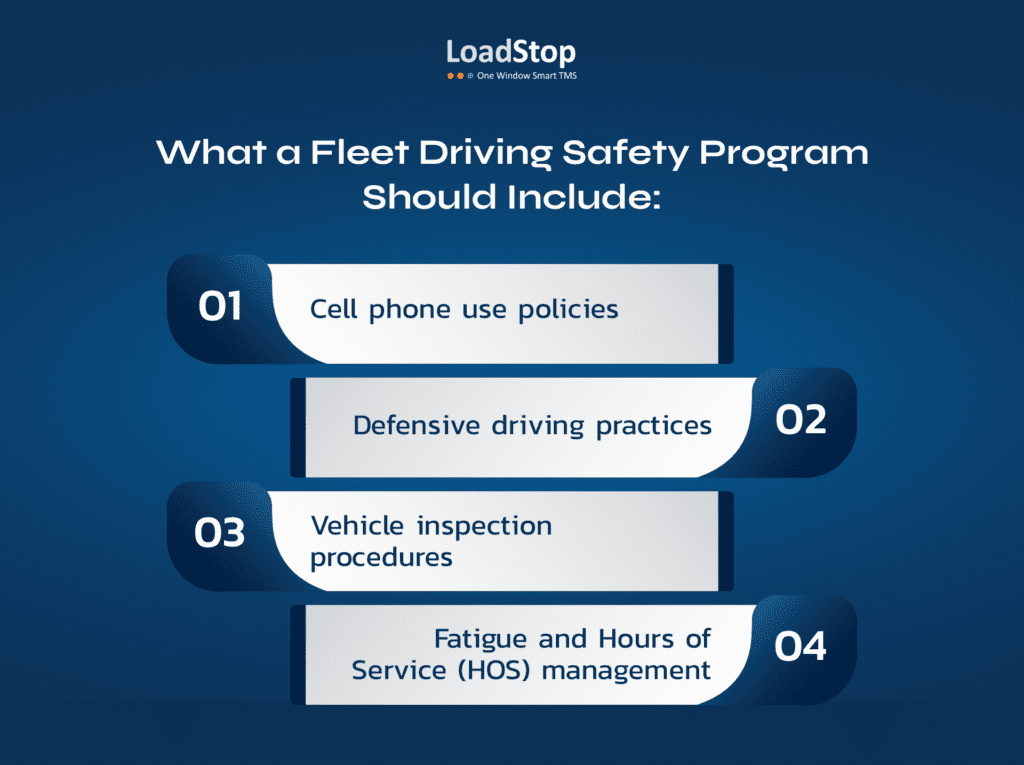
Another crucial component is fatigue management, particularly for long-distance drivers who must adhere to Hours of Service (HOS) rules. A culture of trust and accountability is fostered when drivers are aware that there is a mechanism in place to help and keep them safe.
2. Use real-time monitoring tools
Real-time monitoring is the key to modern fleet safety, which is driven by technology. You can see what’s happening on the road by merging technologies like Advanced Driver Assistance Systems (ADAS), Electronic Logging Devices (ELDs), and dashcams with artificial intelligence (AI).
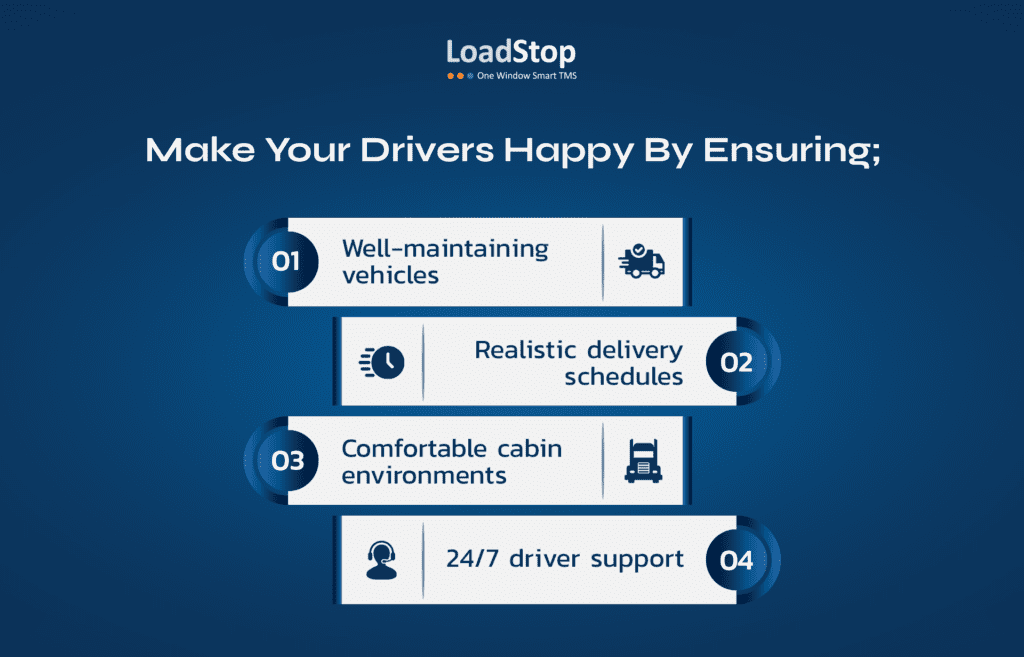
Important behavioral data, including speeding, sudden braking, tailgating, lane-drifting, or indications of exhaustion and distraction, are captured by these instruments. Whether it’s a safety manager identifying a coaching opportunity or a dispatcher stepping in with a fast check-in, real-time notifications enable your team to take prompt action.
Being proactive instead of reactive is the key. In addition to lowering the number of accidents, these technologies act as a safety net for your drivers by providing them with real-time feedback that enables them to make adjustments and maintain their attention on the road.
3. Offer ongoing training and coaching
Driver training isn’t a one-time event. It should be continuous. Use insights from telematics and behavior analytics to provide targeted coaching. Video-based training, ride-alongs, and simulation-based learning can enhance retention.
Provide drivers with personalized feedback and review sessions based on their metrics. Consider using gamified learning systems to increase engagement.
4. Set clear KPIs for driver performance
It cannot be improved if it cannot be measured. For this reason, establishing and disseminating precise, standardized Key Performance Indicators (KPIs) is crucial to promoting behavior change. These indicators ought to be precise, based on data, and in line with operational and safety objectives.
Typical examples are idle time percentages, fuel economy in miles per gallon, HOS compliance, and the amount of hard events (braking, acceleration, and cornering) per 1,000 miles. Additionally, you may keep an eye on trends in speeding and incident frequency.
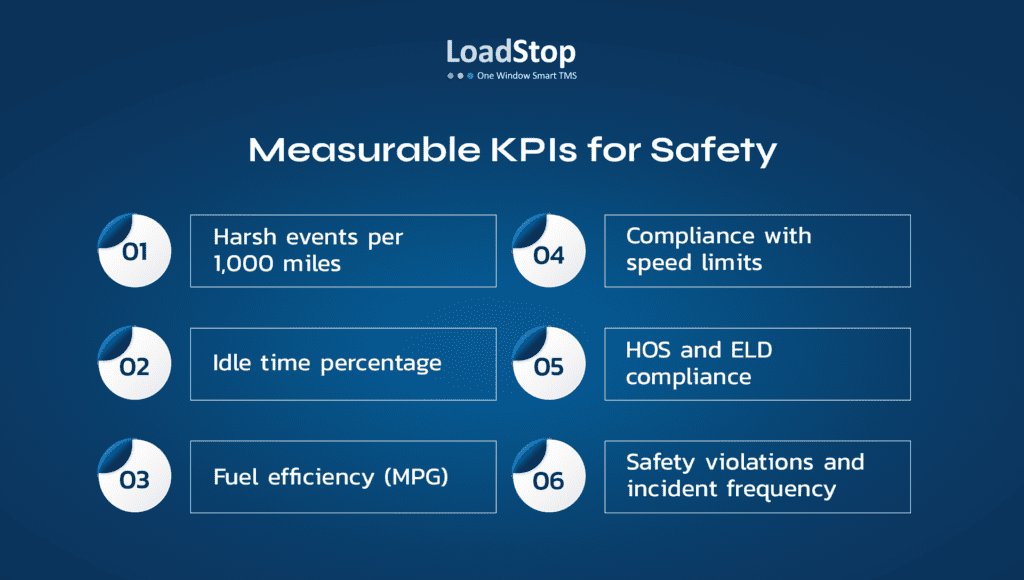
Transparency is increased when drivers are given access to these KPIs via performance scorecards or digital dashboards. Drivers are more likely to remain involved and driven to get better when they know what is being measured, why, and how they compare.
5. Reward efficient fleet drivers
A crucial component of behavior modification is frequently positive reinforcement. Your fleet as a whole benefits from praising and rewarding safe, effective drivers. Good conduct is greatly reinforced by incentive schemes that provide material benefits, such as gift cards, fuel savings shares, performance-based bonuses, or even just public acknowledgment.
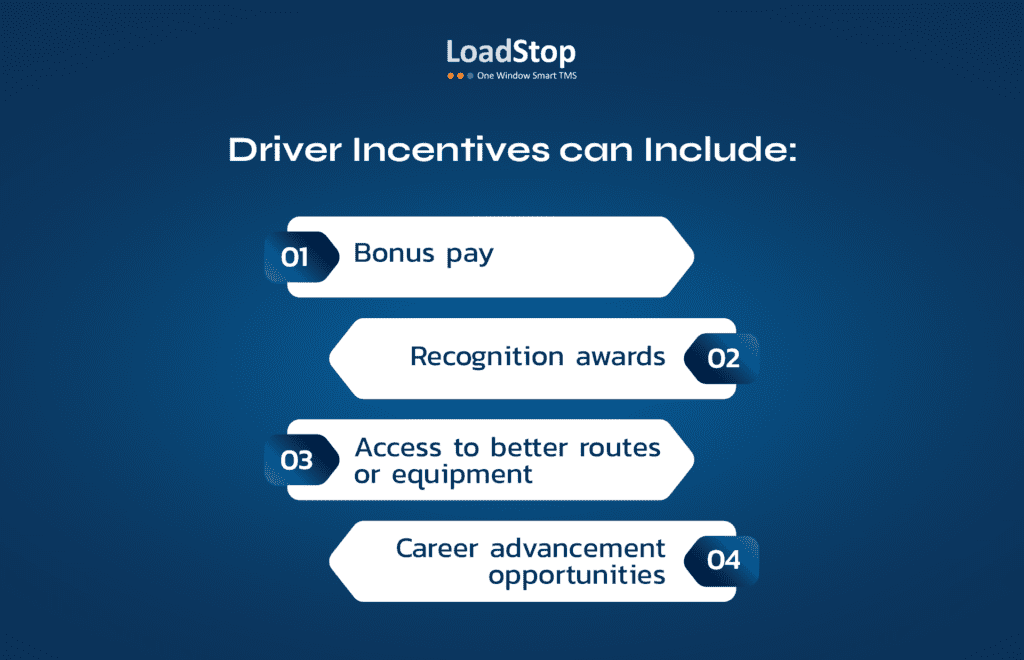
Additionally, you can grant top-performing drivers early access to better-maintained cars, premium routes, or promotion possibilities. Make the crew aware of these incentives to promote healthy competition and raise spirits.
Drivers are more committed to their work and are more likely to remain with your organization when they see that their efforts are valued. And in an industry facing ongoing driver shortages, a strong retention strategy built on recognition can give you a serious edge.
6. Improve drivers’ working conditions
A supportive work environment frequently produces safe, motivated drivers. A driver’s performance on the road is influenced by a number of factors, including the state of their car, the demands of their schedule, and the availability of management.
Make sure cars receive regular maintenance for both driver comfort and mechanical dependability. Make route planning and dispatching more humane and data-driven because strict delivery timelines and arbitrary deadlines lead to stress and unsafe driving practices.
Cabin comforts that help lessen fatigue include ergonomic seating, climate control, and onboard technology. Above all, provide your drivers with round-the-clock assistance, particularly in the event of an emergency on the road, maintenance problems, or scheduling complications.
How LoadStop helps improve driver behavior and fleet performance
LoadStop offers an integrated, intelligent fleet management platform designed to enhance safety, optimize performance, and automate compliance.
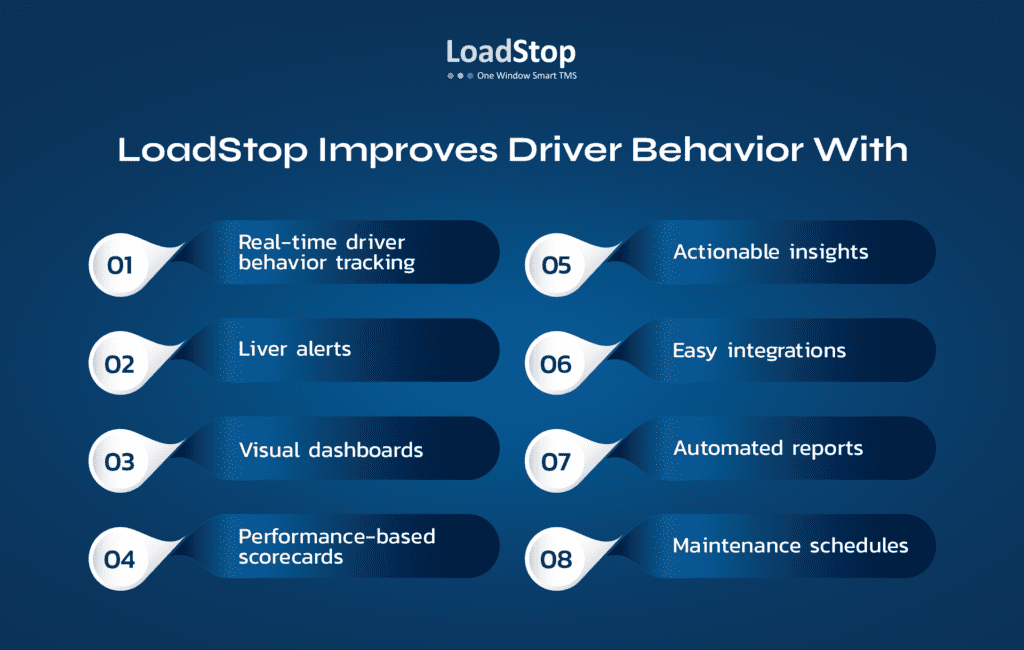
Real-time driver behavior tracking
LoadStop’s platform collects data from vehicle sensors, ELDs, and dashcams to give fleet managers a 360° view of every driver’s activity. Identify and correct unsafe behaviors as they occur, reducing risk and liability. Rather than waiting for end-of-day reports, supervisors can act immediately, minimizing safety risks and potential liabilities.
Live alerts for unsafe actions
Instant alerts notify managers of risky behavior like:
- Sudden lane departures
- Speeding in restricted zones
- Distractions or drowsiness detected via in-cab cameras
- HOS violations
- Other risky behaviors
These live alerts are crucial for high-risk environments and long-haul operations, enabling dispatchers or safety officers to immediately contact drivers, coach them in real time, or schedule follow-up training. This feature supports both driver safety and FMCSA compliance.
Visual dashboards for easy monitoring
Our intuitive dashboard lets managers and trainers visualize trends, identify at-risk drivers, and drill into individual performance metrics. Users may track safety KPIs over time, swiftly identify drivers who pose a risk, and even segment data by vehicle, route, or terminal using the dashboard. It facilitates strategic decision-making and more manageable fleet tracking.
Performance-based and driver-friendly scorecards
LoadStop delivers scorecards that are both comprehensive and easy to understand for drivers. Metrics are visualized and simplified, making it easier for drivers to track their performance and understand areas for improvement.
Metrics, including severe events, idle time, fuel efficiency, and compliance indicators are all included in each scorecard. This gives supervisors a performance baseline for coaching, awards, and remedial action in addition to assisting drivers in taking responsibility for their actions.
Actionable insights for managers and trainers
LoadStop even connects vehicle performance to specific drivers, allowing you to see who operates which trucks more efficiently. Automated reports provide driver behavior analytics, highlighting:
- Driving trends over time
- Comparative performance across teams or terminals
- Training needs and safety risks
- Vehicle-specific insights (e.g., who drives which truck more efficiently)
Integration with fleet management systems
LoadStop seamlessly integrates with popular ELD providers, GPS tracking tools, and telematics platforms, ensuring no data is lost and onboarding is quick. Connect driver profiles with LoadStop’s intelligent dispatch module for optimized load assignments based on driver behavior, availability, and route history. Smarter dispatching = fewer delays and safer deliveries.
Automated reports and KPIs
LoadStop automates daily, weekly, and monthly reports with key performance metrics, including:
- Idle time reports
- Fuel usage trends
- Compliance summaries (DVIRs, HOS)
- Maintenance alerts based on behavior (e.g., wear from hard braking)
While comprehensive dashboards keep safety officials ahead of infractions, automated notifications assist maintenance crews in remaining proactive. Time is saved, less paperwork is produced, and nothing is overlooked because to this simplification.
Maintenance and efficiency insights
The technology can detect early indicators of vehicle stress brought on by risky driving practices by connecting driving behavior with maintenance requirements. For example, excessive idling can result in engine performance checks, and harsh braking can initiate preventive brake inspections.
These insights save thousands of dollars on repairs, increase vehicle lifespan, and decrease unplanned downtime. When used in conjunction with fuel monitoring and route optimization, LoadStop transforms safe driving into a quantifiable return on investment.
Key benefits of effective fleet driver performance management
- Boost fleet safety: Real-time tracking and driver scorecards reduce accidents and violations by promoting safe, consistent driving habits.
- Improve operational efficiency: By monitoring fuel consumption, idle time, and driving routes, LoadStop helps you cut unnecessary expenses and optimize operations.
- Ensure compliance: With automated HOS monitoring and DVIR reporting, your fleet stays FMCSA-compliant while minimizing risk of costly fines or audits.
- Increase driver retention: Performance-based recognition and fair evaluations foster a positive workplace culture that drivers want to be a part of.
- Reduce manual work: Streamline coaching, monitoring, reporting, and compliance tasks—freeing up time for strategic fleet management.
Safer Roads and Smarter Fleets Start with You
Reducing accidents is only one aspect of improving fleet driver behavior; another is revolutionizing the way your business functions as a whole. Improved driving practices have a significant and wide-ranging impact, ranging from reducing fuel expenses and avoiding vehicle wear to boosting driver morale and upholding legal compliance.
You can monitor, manage, and inspire your drivers in real time with the correct technologies, such as LoadStop’s sophisticated fleet management platform. Instead of responding to issues after they arise, you are actively creating a fleet culture that is safer and more effective every single day.
You’re safeguarding not just your assets but also your people by investing in safety programs, real-time monitoring, actionable KPIs, and clever integrations.
The bottom line? Better driving saves lives, cuts costs, and builds a stronger business. Now’s the time to take the wheel and drive that change.
FAQs
Common risks include distracted driving, speeding, hard braking, and excessive idling. Performance management helps prevent accidents, reduces costs, and improves fleet efficiency.
LoadStop provides real-time tracking, behavior alerts, scorecards, and automated reporting, making it easy to monitor and improve driver performance.
Track harsh events (braking, acceleration), idle time, fuel usage, trip efficiency, HOS compliance, and incident reports.



